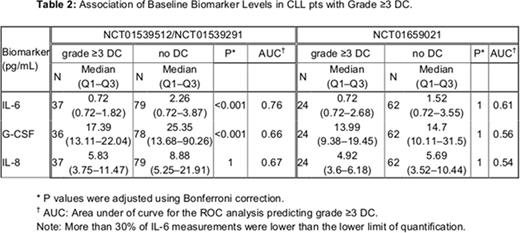Abstract
Introduction: Idelalisib (IDELA) is a selective, small molecule inhibitor of PI3Kd that has shown significant efficacy in treatment of patients (pts) with relapsed chronic lymphocytic leukemia (CLL) and follicular lymphoma (FL). A common adverse event (AE) observed in IDELA studies is diarrhea/colitis (DC): grade ≥3 ~15%. Published preclinical data suggests that PI3Kd plays a critical role in regulating the function and development of regulatory T-cells (T-regs). This biomarker analysis aimed to evaluate possible immune mechanisms that may have contributed to DC in IDELA-treated pts.
Methods: Longitudinal absolute peripheral blood T (CD4+ and CD8+), NK (CD16+/CD56+) cell subsets, cytokines, and chemokine levels from patients treated with IDELA were analyzed (Table 1). Since absolute numbers of T-reg cells were not available, we utilized epigenetic qPCR method (Kleen T. et. al. J Immunother Cancer 2015) to assess the status of T-regs by quantifying FOXP3 utilizing banked peripheral blood mononuclear cells (PBMCs). The following cytokines and chemokines were measured: IL-12p40, IL-17A, IFNγ, TNFα, G- CSF, MIP1α (CCL3), CCL5 (RANTES), IL-10, IL-1RA, IL-6, IL-7, IL-8, IL-15, CRP, and IP-10 (CXCL10). We evaluated the association of changes from baseline of these biomarker(s) with the occurrence and severity of DC events during IDELA treatment. Association of cytomegalovirus (CMV) with DC was not addressed in this study and is being presented separately.
Results: There were no differences in absolute numbers of T (CD4+ or CD8+) and NK cells between pts treated with IDELA in both trials with grade ≥3 DC vs those with no DC. Consistently, results from epigenetic qPCR analysis also demonstrated no differences in temporal profiles for peripheral T-cell subsets (CD3+, CD8+, or FOXP3+) in CLL pts treated with IDELA with grade ≥3 DC vs no DC. Baseline and on-treatment changes in peripheral T-cell subsets were not predictive of DC. Analysis of T-cell subsets from the visit immediately prior (t-1) to the first occurrence of grade ≥3 DC was not predictive, and revealed no differences compared to pts with no DC. Lower levels of CD3+, CD8+, and FOXP3+ were noted longitudinally as well as at t-1 visits in grade 1/2 DC vs non-DC pts, but these changes were not predictive of grade 1/2 DC. Increased levels of circulating pro-inflammatory cytokines (IL-15, IFN-γ, and CLL5) were noted in both CLL and indolent non-Hodgkin lymphoma (iNHL) pts treated with IDELA. IL-17A level was significantly higher at the t-1 visit in CLL pts with grade ≥3 DC vs no DC. However, Receiver Operating Characteristic analysis deemed that neither individual cytokine/chemokine or in combination was not predictive for DC occurrence. CLL/iNHL pts with grade ≥3 DC vs no DC were noted to have higher on treatment IL-8. CLL pts presented lower baseline IL-6 and G-CSF levels in patients with grade ≥3 DC vs no DC (Table 2). There were no associations between baseline circulating plasma markers and DC in pts with iNHL.
Conclusion: With currently available data, no single circulating immune biomarker is associated with or is predictive for the development of DC during treatment with IDELA. Lower levels of CD3+, CD8+, and FOXP3+ were noted longitudinally in grade 1/2 DC vs no DC pts. No differences were observed in temporal profiles for T-cell subsets in pts with grade ≥3 DC vs those with no DC. However, higher on-treatment IL-8 and lower baseline IL-6 and G-CSF were noted in the relapsed CLL pts with grade ≥3 DC when compared with no DC pts. While quantitative analysis of these T-cell subsets was not associated with grade ≥3 DC, the qualitative function of T-cells may play a role in mediating DC. Functional assays for T-cells were not explored in this study. In addition, our concurrent analysis of colonic biopsies and association with CMV in pts with IDELA associated DC will be presented separately.
Furman:Pharmacyclics: Consultancy, Speakers Bureau; Gilead Sciences: Consultancy; Janssen: Consultancy; Genentech: Consultancy; Abbvie: Consultancy, Honoraria. Hallek:Mundipharma: Consultancy, Honoraria, Other: travel support, Research Funding, Speakers Bureau; Gilead: Consultancy, Honoraria, Other: travel support, Research Funding, Speakers Bureau; Janssen-Cilag: Consultancy, Honoraria, Other: travel support, Research Funding, Speakers Bureau; Celgene: Consultancy, Honoraria, Other: travel support, Research Funding, Speakers Bureau; Amgen: Consultancy, Honoraria, Other: travel support, Research Funding, Speakers Bureau; F. Hoffmann-LaRoche: Consultancy, Honoraria, Other: travel support, Research Funding, Speakers Bureau; AbbVie: Consultancy, Honoraria, Other: travel support, Research Funding, Speakers Bureau. Sharman:Gilead Sciences, Inc.: Honoraria, Research Funding. Hillmen:Pharmacyclics: Research Funding; Janssen: Honoraria, Research Funding; Roche: Honoraria, Research Funding; Gilead: Honoraria, Research Funding; Abbvie: Research Funding. Zelenetz:Gilead Sciences: Research Funding. Flinn:Janssen: Research Funding; Pharmacyclics LLC, an AbbVie Company: Research Funding; Gilead Sciences: Research Funding; ARIAD: Research Funding; RainTree Oncology Services: Equity Ownership. Jurczak:Gilead Sciences: Research Funding; Janssen: Research Funding; Celltrion, Inc: Research Funding; Acerta: Research Funding; Bayer: Research Funding. Munugalavadla:Gilead Sciences: Employment, Equity Ownership. Xiao:Gilead Sciences: Employment, Equity Ownership. Zheng:Gilead Sciences: Employment, Equity Ownership. Rao:Gilead Sciences: Employment, Equity Ownership. Dreiling:Gilead Sciences: Employment, Equity Ownership. Salles:Roche/Genentech: Consultancy, Honoraria, Research Funding; Janssen: Consultancy, Honoraria; Gilead: Honoraria, Research Funding; Celgene: Consultancy, Honoraria; Novartis: Consultancy, Honoraria; Amgen: Consultancy, Honoraria; Mundipharma: Honoraria. O'Brien:Pharmacyclics, LLC, an AbbVie Company: Consultancy, Honoraria, Research Funding; Janssen: Consultancy, Honoraria.
Author notes
Asterisk with author names denotes non-ASH members.



